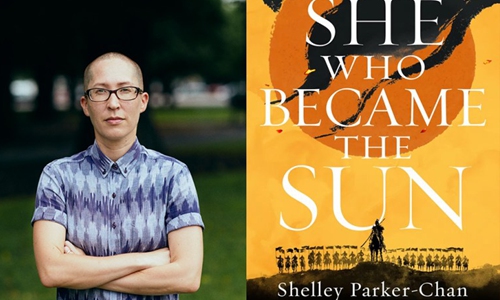ARTS / CULTURE & LEISURE
Hugo Award nominee draws controversy for feminist re-imagining of Chinese history

She Who Became the Sun, an English novel based on Chinese history that was recently nominated for the 2022 Hugo Awards for Best Novel has become embroiled in controversy.Photo: Screenshot from web
An English novel based on Chinese history that was recently nominated for the 2022 Hugo Awards for Best Novel has become embroiled in controversy. The storyline, touching on a theme of gender equality, re-imagines history by changing the Hongwu emperor into a woman, which some Chinese readers have said is just a gimmick to express the author's ideas, and that it may mislead foreign readers.
Among the six books nominated for the award, She Who Became the Sun is based on the deeds of Zhu Yuanzhang, the Hongwu emperor in China's Ming Dynasty (1368-1644). In the book, the task of saving the world falls to Zhu's sister after Zhu Yuanzhang unexpectedly dies young in 1345.
"Though I'm interested in this book, I still have to say that I don't think a female character who is depicted with many masculine features can show a true appreciation of women, or show that the writer really understands feminist power," a female reader in Beijing told the Global Times.
In the novel, Zhu Chongba, later known as the emperor Zhu Yuanzhang, was in the beginning given the destiny to achieve greatness while his sister, the second daughter of Zhu's family, was set for relative anonymity.
However, a bandit changed the siblings' fate, with Zhu Chongba dying in despair. His sister uses her brother's identity and searches for the path to power before establishing the Ming dynasty.
The novel was created by Asian-Australian literary fantasy author Shelley Parker-Chan, a former diplomat and international development adviser who works in human rights, gender equality and LGBTQ+ rights.
The storyline soon caused quite a discussion among many readers in China, who question the use of an existing historical role to highlight the status of women.
"If the author wants to express the value of women and human rights through writing, why not make it completely fictional instead of adding Chinese historical elements just to attract readers?" said one reader on Sina Weibo.
Zhou Xueying, a historian in Nanjing, expressed his concerns about the "historical references" presented in the novel, saying it would be unfortunate if readers are misled by this re-imagination of Chinese history.
"It is like a double-edged sword that can cause disaster if the writer only uses history to set a scene without respecting its authenticity, or rewriting historical facts as bait to lure more readers," Zhou said, adding that history "should not be distorted."
As the story contains elements from history, fantasy, and role exchanges, readers pointed out that similar books can be found on popular Chinese online novel websites, such as The Three-Body Problem.
.
This isn't the first English book based on Chinese history. Chinese-born Canadian writer Xiran Jay Zhao's bestselling sci-fi novel Iron Widow also blends Chinese history involving female Empress Wu Zetian and science fiction.
As for feminism, Zhu shared his views on how it should be represented in cultural works.
"Men and women both make history, and it is always about what they do rather than how one is better because of their gender. To add too many 'male' characteristics to a female character shows a lack of respect for women as they are," Zhou said.
